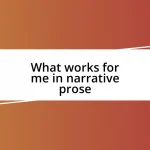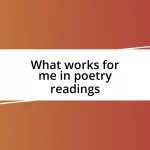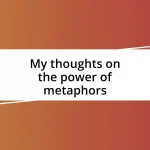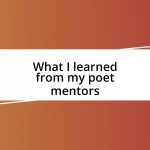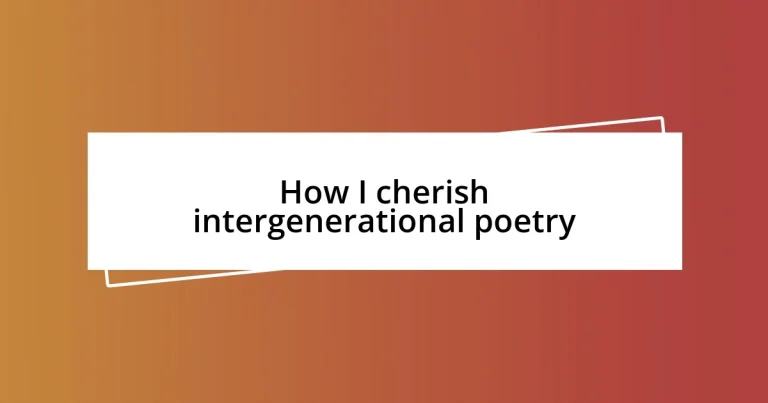Key takeaways:
- Intergenerational poetry fosters empathy and connection across different age groups by highlighting shared human experiences and emotions.
- Collaborative writing techniques, such as choosing a shared theme and blending contrasting styles, enrich the poetic process and deepen understanding between generations.
- Engaging in poetry communities and preserving written legacies allow us to celebrate our unique backgrounds while acknowledging the timelessness of human emotions and experiences.
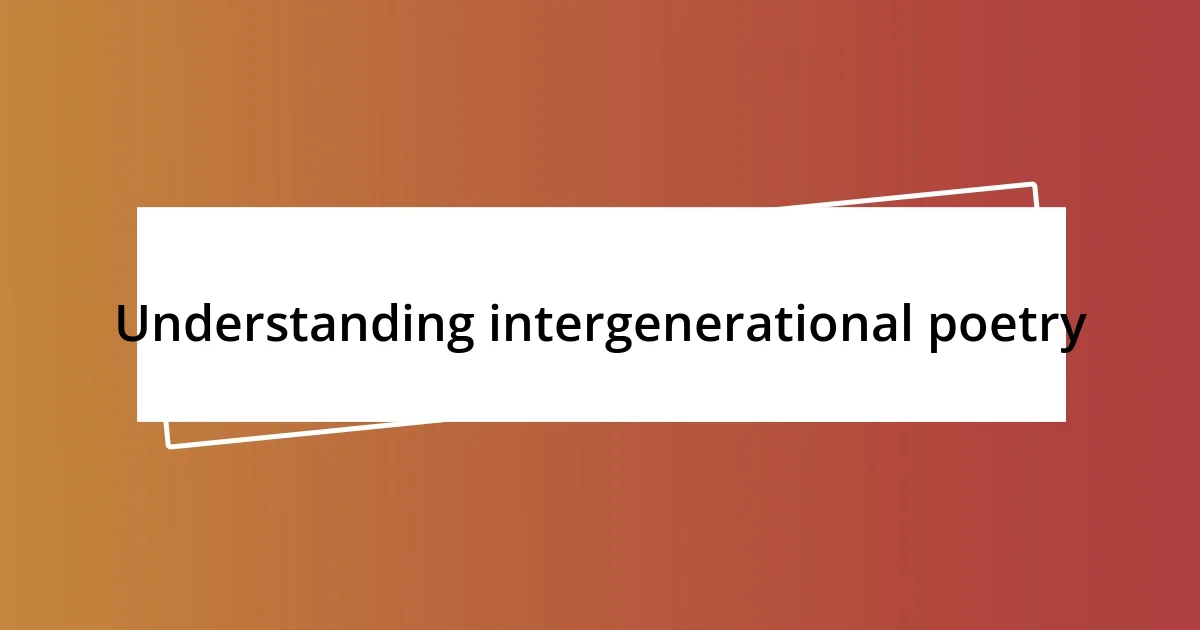
Understanding intergenerational poetry
Intergenerational poetry serves as a bridge connecting different age groups, allowing us to share experiences and emotions across time. When I first read my grandmother’s poems, I was struck by how they spoke to the struggles and joys I experienced in my own life. It’s as if these words echoed through generations, reminding me that while our contexts may vary, our feelings often resonate on the same frequency.
What makes intergenerational poetry so captivating is its ability to shine a light on shared human experiences, transcending age barriers. I often find myself pondering: how can a poem penned decades ago still feel relevant today? Each time I revisit those timeless works, I unravel layers of meaning that relate to my personal journey, revealing that our stories, regardless of when they were written, are deeply intertwined.
In my experience, engaging with poetry across generations fosters empathy and understanding. For instance, as I delved into the verses of a poet from the 1960s, I felt a strange kinship with their sentiments of social unrest. It reminded me that the challenges of one era can mirror those of another, reinforcing the idea that poetry has an enduring power to unite us, regardless of our age or background.

The value of shared experiences
Shared experiences have a unique ability to create bonds that transcend age and background. I remember sharing a poem with my niece during a family gathering. She was initially hesitant, but as I recited the lines, I could see her face light up with recognition. It turned out that the poem reflected her own struggles with identity, drawing a parallel between a youth in the 1970s and her own today. It’s moments like these that highlight how poetry can crystallize emotions, allowing us to connect deeply, even across generations.
- Encourages empathy as we explore different perspectives.
- Helps us realize that feelings of joy and sorrow are universal.
- Creates a platform for open dialogue about our shared humanity.
- Bridges the generational gap, fostering understanding and connection.
- Illustrates that life’s challenges may evolve, but the emotions remain constant.
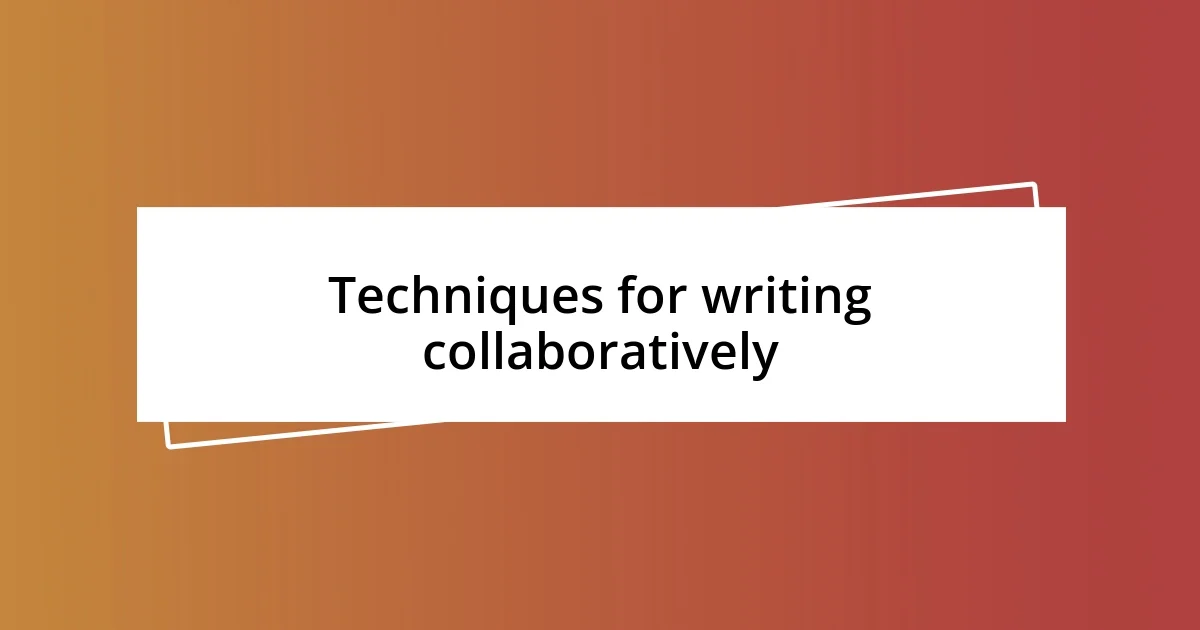
Techniques for writing collaboratively
When it comes to collaborative writing in the realm of poetry, I find that developing a shared theme is essential. I once collaborated with a friend from a different generation, and we chose “home” as our focal point. This common ground invited us to explore our unique interpretations, resulting in a rich tapestry of ideas that neither of us could have crafted alone. It was fascinating to see how our descriptions of “home” revealed so much about our individual experiences and backgrounds.
Another effective technique is utilizing contrasting styles. I remember co-writing with a younger poet who favored vivid imagery and metaphor, while I leaned towards simple, straightforward language. This approach forged a beautiful dialogue within our poem, creating layers of meaning and texture that showcased our generational differences. It taught me that poetry can be a wonderful exploration of diverse voices, enhancing the reader’s experience.
Lastly, holding regular brainstorming sessions can significantly enhance collaborative projects. During a recent workshop, I facilitated a session where participants, ranging from teenagers to seniors, generated ideas together. The energy in the room was electric! Collaborative brainstorming not only sparked creativity but also forged unexpected connections between participants. I left with new insights and a sense of unity—proof that our combined perspectives can birth something truly unique.
| Technique | Description |
|---|---|
| Shared Theme | Focus on a central topic to explore different interpretations. |
| Contrasting Styles | Blend diverse writing styles for depth and texture. |
| Regular Brainstorming | Engage in idea generation sessions for collective creativity. |
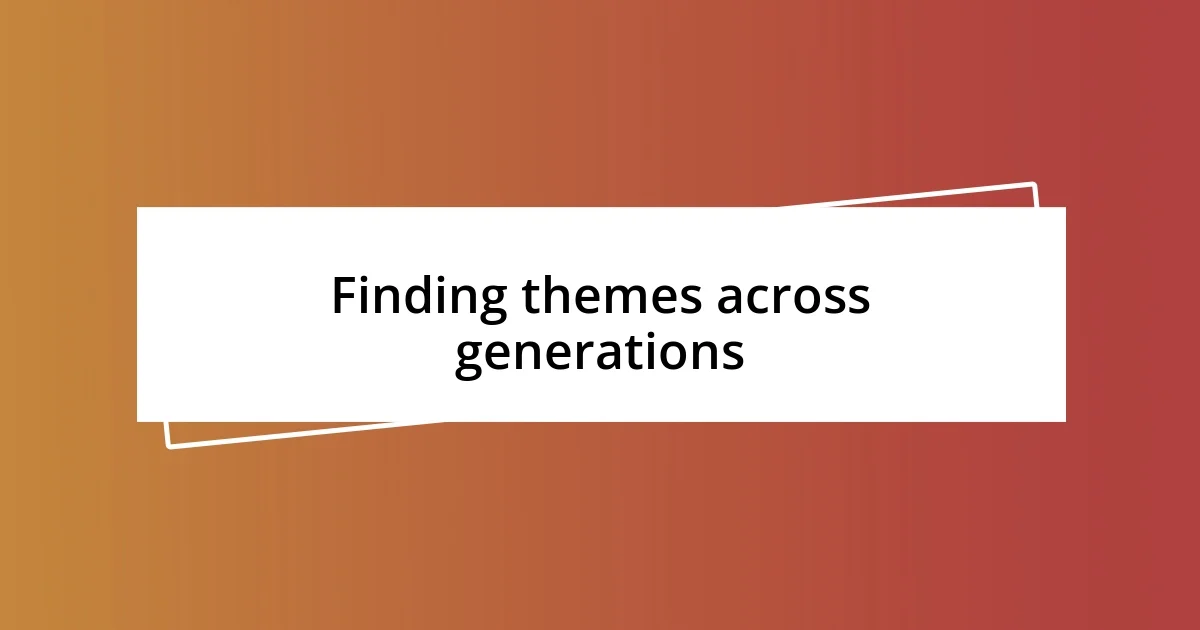
Finding themes across generations
Finding themes across generations is truly fascinating. I recall a time when I organized a poetry night that brought together not just poets of various ages, but entire families. One of the younger participants shared a poem about dreams, which resonated deeply with an elderly gentleman in the audience. He remarked how his dreams of success during his youth were mirrored in the young poet’s aspirations today. Isn’t it incredible how our hopes can echo across decades?
When I reflect on the themes that often arise, love and loss seem to be the common threads that link us all. I once discussed a poignant poem about heartbreak with my grandfather. It was touching to hear his stories from the past, emotions still so raw, despite the years that had passed. This exchange revealed to me that while the specifics of our experiences may differ, the emotions themselves are a constant that bind us, regardless of when we lived.
I’ve also noticed that our interpretations of social issues change with time, yet the core message often remains timeless. A recent conversation about a poem highlighting struggles with societal acceptance sparked a lively debate among participants of various ages. Hearing the younger ones express their thoughts, while the older generation shared their historical context, opened my eyes to how much we can learn from one another. It felt like a bridge was formed between experiences, demonstrating that while contexts evolve, the core human experience is ageless. What insights have you gained when exploring these generational themes?
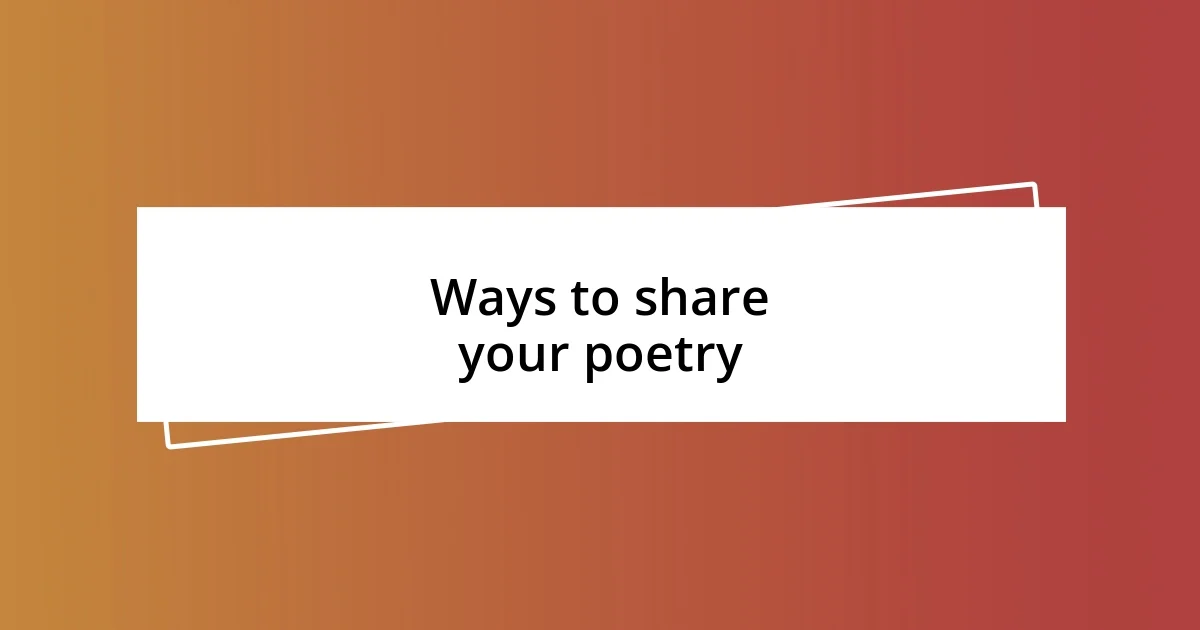
Ways to share your poetry
Sharing poetry can be an enriching experience, and one of my favorite ways to do this is through informal poetry circles. I remember a cozy gathering at a local café where poets of all ages showcased their work. The atmosphere was warm, allowing everyone to open up and share not just poems but laughter and personal stories. It reminded me how poetry can be more than words on a page; it can deepen connections between people.
Online platforms have also transformed how we share poetry. I once participated in a virtual open mic night that attracted poets from various backgrounds and locations. It was eye-opening to hear diverse perspectives, and I found that even though we were miles apart, our words resonated deeply with one another. Can you imagine the possibilities when people from different generations engage in such spaces? You often discover shared emotions echoing through the lines, despite varying life experiences.
Lastly, collaborating on community projects can create beautiful opportunities for sharing poetry. I involved myself in a neighborhood initiative where we collected poems from local residents, young and old, to compile into a community anthology. It was humbling to see how each person expressed their unique feelings about our shared environment. I wonder—what stories might be hidden in your community? By sharing poetry in this way, we celebrate our differences and collectively embrace what unites us.
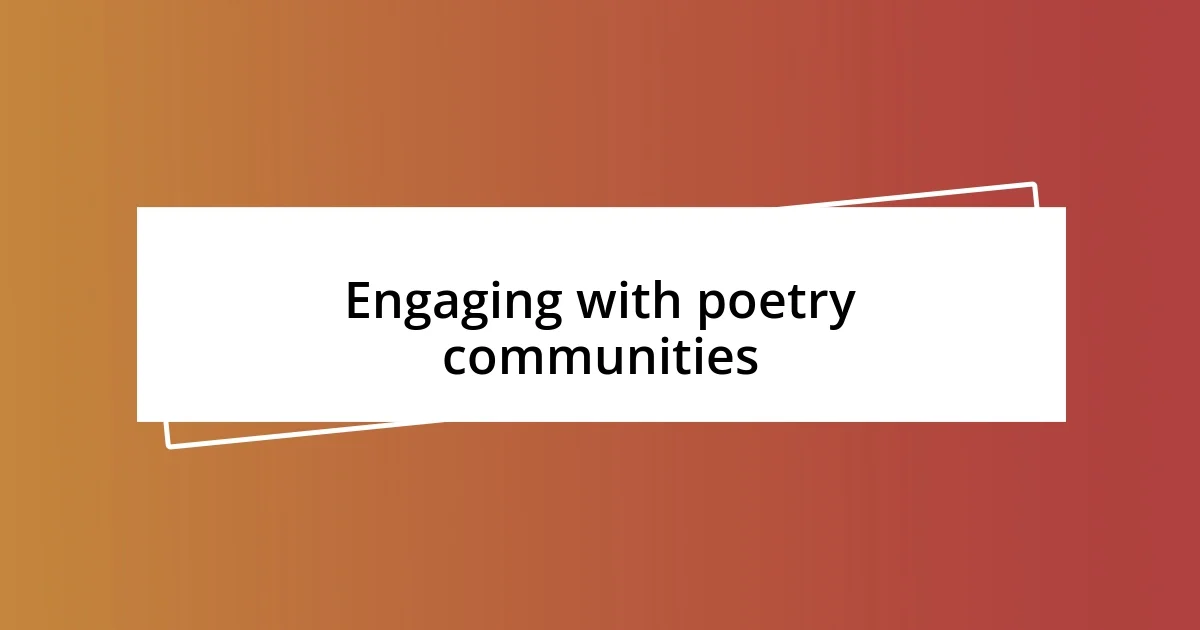
Engaging with poetry communities
Engaging with poetry communities can deeply enrich our understanding of different perspectives. I recall attending a workshop where participants were encouraged to write and perform poems inspired by their childhood memories. One young lady read a piece about her grandmother’s garden. As she shared her words, I could see the faces of older attendees light up with recognition. It felt like a shared revelation—how memories can bloom anew in every generation’s heart. Doesn’t it make you wonder how many untold stories are waiting for the right moment to blossom?
Another memorable experience was during a local poetry competition that welcomed poets of all ages. As I listened to a ten-year-old recite her poem about friendship, a lovely synergy developed among the diverse crowd. Later, I overheard a seasoned poet discussing how the themes in her work had shifted as she aged, yet the essence of connection remained central. This exchange of ideas across age lines was a vivid demonstration of how poetry fosters dialogue. Have you ever engaged in such discussions that expanded your view of your own writing?
I’ve also observed that local poetry groups often serve as safe spaces for vulnerability. I remember a brave moment when an elder shared a poem that was raw and reflective of his struggles with loss. The silence in the room was palpable, as everyone took a moment to absorb his words. In that space, age felt irrelevant; we were all readers and listeners bonded by shared humanity. Isn’t it profound how poetry can strip away barriers, allowing our hearts to speak freely?
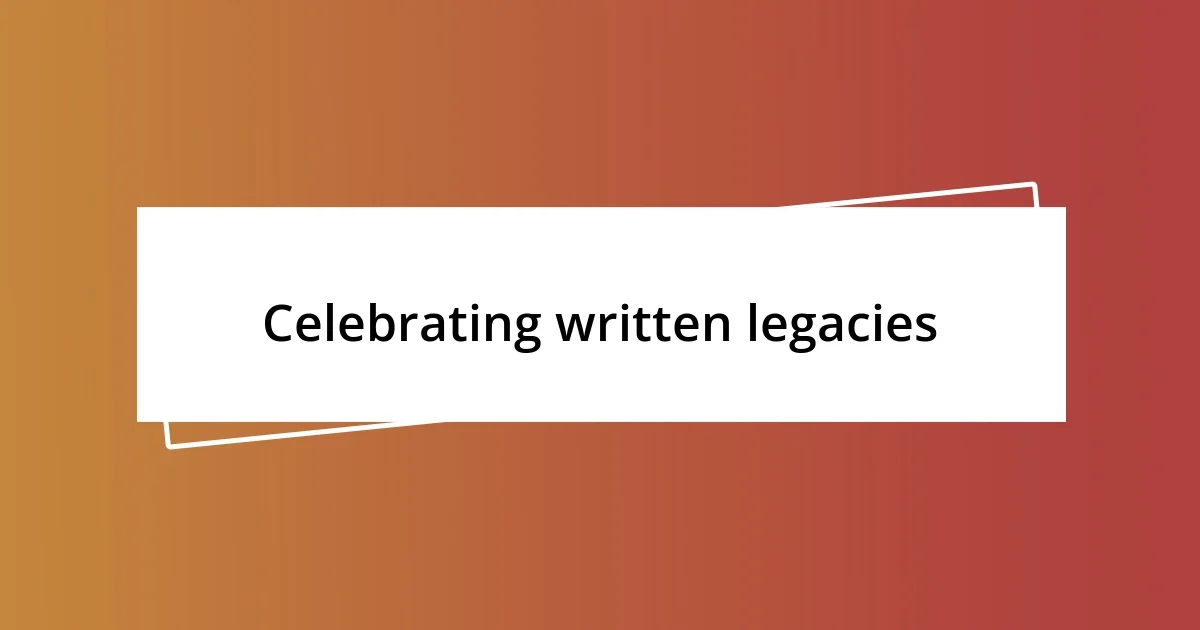
Celebrating written legacies
Embracing the written legacies in poetry is like holding a mirror to our past, reflecting the voices of those who came before us. I vividly recall thumbing through my grandmother’s old journals, filled with her poems, each line brimming with emotion and wisdom. It struck me how her words connected me to a world I never knew, revealing her dreams and struggles. Have you ever stumbled upon personal writings that felt like a conversation across time?
Each poem becomes a tangible link to our familial roots. I remember a time I participated in a family reunion where we invited everyone to share poems passed down through generations. The sheer joy of hearing my aunt recite a poem written by my great-grandfather was unforgettable. It was more than just words; it was a celebration of resilience. What if we all took a moment to preserve our family’s poetic heritage?
Even today, I find joy in discovering new poetic interpretations of these legacies through workshops. At one session, we explored how to reinterpret old poems with contemporary themes. A participant shared their reimagined version of an ancestor’s love poem, infused with modern language. It felt electric—like honoring the past while making it relevant for today. How does living in the present influence the way you perceive and celebrate timeless legacies?

